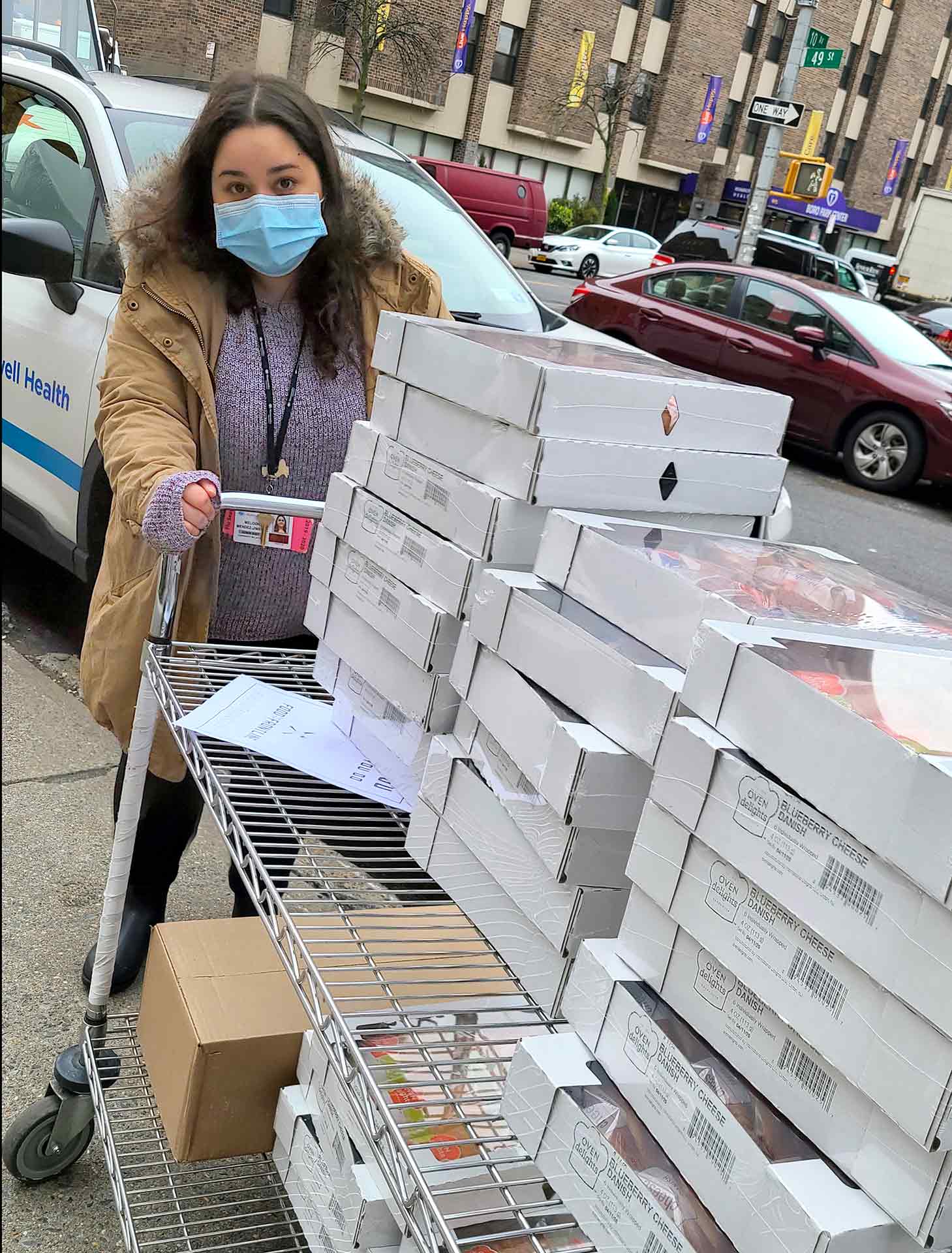- April 20, 2020
- By Annie Krakower
As Marlowe Sidney Bamberger ’95 watched the streets of her normally bustling Tribeca neighborhood suddenly grow quiet, she felt the call to do something. New York City had quickly become the epicenter of the COVID-19 pandemic in the United States, with more than 12,000 deaths. But what could she do while stuck in quarantine?
The UMD alum turned to Facebook to find out, and within weeks, one post turned into a rapidly growing fundraising campaign that quickly found a name: Food for the Frontline NYC.
The two-pronged effort provides meals for the health care workers battling the coronavirus pandemic while supporting local restaurants. In less than a month, the campaign has raised nearly $45,000, enabling more than 50 food deliveries of 7,500 meals.
“It’s been very challenging to see this city empty,” Bamberger said. “Fortunately, we are helping.”
When the stay-at-home order first began in New York last month, Bamberger sought to support local businesses by ordering in for herself, her husband (also a UMD alum) and their two kids. “But what does a dinner for four really do?” Bamberger said. But she realized she could combine one cause with another by placing larger orders and sending the food to doctors and nurses working 12-plus-hour shifts.
No stranger to fundraising, the freelance nonprofit event planner published her initial post on Facebook, asking friends to send what they could to her Venmo account to help deliver meals to the frontline. A few hours later, she’d raised $1,000, and staff of the emergency room at Lenox Hill Hospital on the Upper East Side had lunch from local burger place Schnipper’s that afternoon—plus breakfast the next morning. Medical workers took to Facebook to express gratitude for the “outpouring of support,” as one nurse wrote.
“(Bamberger’s) mission was two-fold, and she stuck to it,” said Andrea Schnipper, social media and community relations manager at Schnipper’s. “We get big thanks on both sides: hospital workers and our employees.”
 The next day, a friend connected Bamberger with medical students at New York–Presbyterian Hospital, and donations rolled in for a second lunch delivery. As people continued sharing the Facebook post, the fundraiser—which Bamberger shifted from her Venmo account to a GoFundMe page—took off from there, allowing for food deliveries to more than 10 hospitals around Manhattan and even inspiring a similar campaign in Brooklyn.
The next day, a friend connected Bamberger with medical students at New York–Presbyterian Hospital, and donations rolled in for a second lunch delivery. As people continued sharing the Facebook post, the fundraiser—which Bamberger shifted from her Venmo account to a GoFundMe page—took off from there, allowing for food deliveries to more than 10 hospitals around Manhattan and even inspiring a similar campaign in Brooklyn.
“I don’t do sewing (to make masks). I’m never gonna be a doctor or nurse,” Bamberger said. “I can’t do what they’re doing. The least I can do is make their lives easier.”
The effort has been a big help for the local eateries, too—like Schnipper’s, Hill Country Barbecue Market, Murray’s Bagels, Pick-A-Bagel and more—which have lost business with dining areas off-limits and customers sheltering in place. Such restaurants “give without hesitation” when schools or PTAs are in need of donations, said Bamberger, a public school parent, so she’s happy to return the favor.
“It’s been a nice symbiotic relationship. We’re able to provide meals on cost-effective basis, but also get some revenue when we really need it,” said Marc Glosserman, founder and CEO of Hill’s Country. “To know that we’re doing a small part to help our friends and neighbors is meaningful. It gives our team in this time a greater sense of purpose.”
And for Bamberger, besides helping the hospital workers and local businesses, giving provides a third benefit: a way to stay connected to the community in a time of isolation.
“The donors are so grateful for feeling like they’re doing something,” she said. “We’re at a point right now where we are handcuffed where we can go, when we can go, how we can go. Everyone just needs a little good news.”
Topics
People